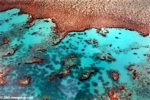Emissions of carbon over the last two centuries have raised the acidity of the oceans to the highest levels in 21,000 years and likely beyond, according to a new study in Nature Climate Change. The change threatens a number of marine species, including coral reefs and molluscs.
The oceans play a massive role in the carbon cycle, sequestering a significant amount of the carbon released naturally. But for the past couple centuries human activities, such as burning fossil fuels and deforestation, have substantially increased the amount of carbon emitted into the atmosphere, forcing the oceans to sequester more. Currently, the oceans sequester about one third of all carbon emissions, however this influx of carbon is not benign: the carbon lowers the sea waters pH levels (a rise in acidity).
“In some regions, the man-made rate of change in ocean acidity since the Industrial Revolution is hundred times greater than the natural rate of change between the Last Glacial Maximum and pre-industrial times,” explains lead author Tobias Friedrich at the International Pacific Research Center, University of Hawaii at Manoa, Honolulu, Hawaii.
The researchers used computer models to estimate the the abundance of a calcium carbonate known as aragonite in sea water—a commonly used proxy for acidification—from the Last Glacier Maximum (21,000 years ago) to today. According to the authors, it’s not just the level of acidity that is worrisome, but the speed at which it is happening.
“When Earth started to warm 17,000 years ago, terminating the last glacial period, atmospheric CO2 levels rose from 190 parts per million (ppm) to 280 ppm over 6,000 years. Marine ecosystems had ample time to adjust. Now, for a similar rise in CO2 concentration to the present level of 392 ppm, the adjustment time is reduced to only 100–200 years,” Friedrich says.
Species that produce shells and plates out of calcium carbonate are at risk from acidification, since acidity lowers the amount of available calcium carbonate. Carbonate ion concentrations are currently at their lowest rate in nearly a million years endangering shell fish, types of algae, foraminifera, pteropods, and corals. According to a recent report by 2100, 70 percent of cold water corals will be exposed to high acidification levels. As the most biodiverse ecosystem in the oceans, many species stand to lose out if coral reefs vanish.
“Our results suggest that severe reductions are likely to occur in coral reef diversity, structural complexity and resilience by the middle of this century,” says co-author Professor Axel Timmermann, also with the International Pacific Research Center in Hawaii.
Currently the only long-term solution to ocean acidification is to cut global carbon emissions.
CITATION: T. Friedrich, A. Timmermann, A. Abe-Ouchi, N. R. Bates, M. O. Chikamoto, M. J. Church, J. E. Dore, D. K. Gledhill, M. González-Dávila, M. Heinemann, T. Ilyina, J. H. Jungclaus, E. McLeod, A. Mouchet, and J. M. Santana-Casiano: Detecting regional anthropogenic trends in ocean acidification against natural variability. Nature Climate Change – DOI: 10.1038/NCLIMATE1372.
Related articles
Ocean prognosis: mass extinction

(06/20/2011) Multiple and converging human impacts on the world’s oceans are putting marine species at risk of a mass extinction not seen for millions of years, according to a panel of oceanic experts. The bleak assessment finds that the world’s oceans are in a significantly worse state than has been widely recognized, although past reports of this nature have hardly been uplifting. The panel, organized by the International Program on the State of the Ocean (IPSO), found that overfishing, pollution, and climate change are synergistically pummeling oceanic ecosystems in ways not seen during human history. Still, the scientists believe that there is time to turn things around if society recognizes the need to change.
Ocean acidification dissolves algae, deafens fish
(06/02/2011) As if being a major contributor to global warming wasn’t enough, the increasing amount of carbon dioxide produced through human activity is also acidifying our oceans – and doing so more rapidly than at any other time in more than half a million years. New projections show that at current rates of acidification, clownfish and many species of algae may be unable to survive by 2100.
Coral crisis: 75% of the world’s coral reefs in danger

(02/23/2011) Marine scientists have been warning for years that coral reefs, the most biodiverse ecosystems in the ocean, are facing grave peril. But a new comprehensive analysis by the World Resources Institute (WRI) along with twenty-five partners ups the ante, finding that 75% of the world’s coral reefs are threatened by local and global impacts, including climate change. An updating of a 1996 report, the new analysis found that threats had increased on 30% of the world’s reefs. Clearly conservation efforts during the past decade have failed to save reefs on a large-scale.